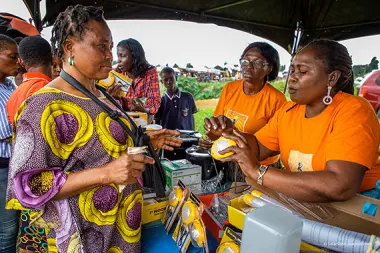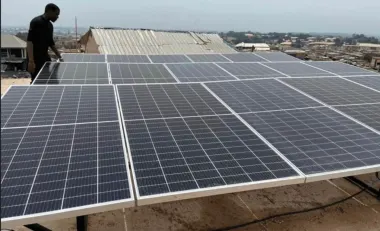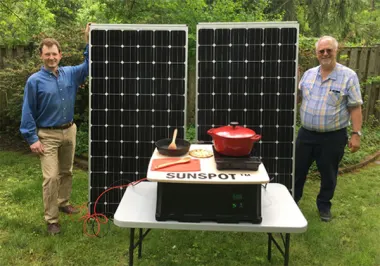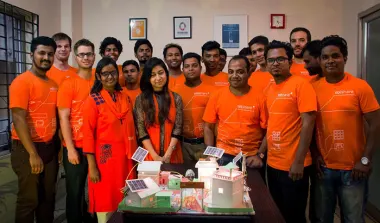Renewable Transformation Challenge

Elsevier-ISES Renewable Transformation Challenge
About the Challenge
The objective of the Elsevier-ISES Renewable Transformation Challenge Promotion (“Challenge”) is to recognize and honor outstanding work towards a world powered by renewable energy and with accessible energy for all. This objective is consistent with the vision of the International Solar Energy Society (ISES), which is for a world powered by 100% renewable energy used efficiently and wisely and accessible for all. To achieve this vision, a global transformation of our energy systems to efficient and affordable renewable energy must take place.
The Challenge promotion is administered every two (2) years to recognize accomplishments by organizations such as private enterprises, NGOs, and research institutions for undertaking projects and programs that help move the world toward an energy system supplied entirely by renewable energy sources, or for conducting the critical analyses that provide meaningful roadmaps for the transformation. The award winner represents one step towards furthering ISES’ vision. This vision can only be achieved through private and civil society initiatives towards innovative and successful programs that adopt the use of renewable energy technologies, and the intelligent application of energy efficiency measures. In the context of this Challenge, the energy transformation applies to all end-use energy consumption: power, heat, and transport.
Applications for the Challenge are invited from organizations who can demonstrate that they have established successful projects, innovative technologies, financing schemes, policy initiatives, or renewable energy programs, or from institutions that have undertaken research and analyses and identified solutions that demonstrate how this goal is being met. The Challenge can include either supply side (energy generation for end-use energy consumption) or demand side (including energy efficiency) programs, or both, and applicants may address any or all of the end-use energy sectors mentioned above.
Innovative ideas will be given preference over incremental improvement projects.
The Challenge is not a funding body and applications still in the conceptual stage with little supporting evidence of viability are unlikely to proceed past the first evaluation phase.
Details of how the application supports the progress towards the 100% renewable energy transformation must be very clear.
The winning proposal will be the one that best demonstrates a contribution to the transformation to a world powered by renewable energy and that ideally has potential to widen access to energy, particularly in developing countries.
Prize
There is a €20,000 prize for the first-place entry. The winner, or one representative of the winning team, will be invited to attend the ISES Solar World Congress 2025 in Fortaleza, Brazil from November 4-7, 2025 and the Congress Awards Banquet, where the winner/representative will present the project. The winner, or one representative of the winning team, will receive one Gold membership to the Society. The winning project will be featured on this website, the journal homepage of Solar Energy and on the ISES website.
Judging criteria
A panel of international solar and renewable energy specialists will review the applications, and the top ten will be put forward to Elsevier-ISES awards’ judging committee for the selection of the winning proposal. The judges will evaluate the applications based on the following evaluation criteria:
Clearly demonstrates that the application supports a transformation towards 100% renewable energy;
Be replicable, scalable and sustainable;
Set a benchmark for innovation – new ideas or concepts will be given preference over incremental improvement projects;
Have practical applicability and a clear demonstration of impact; e.g. does it consider a feasible implementation plan of the project?
Be suitable for application in developing countries; consider the project’s social impact on local communities.
Submit your proposal
Submit your proposal on the SKILD platform. Visit rtc2025.skild.com se abre en una nueva pestaña/ventana.
Applications will be accepted from 01 March 2025 until 30 April 2025. Please send any queries you may have about the Challenge or your Application to: [email protected] se abre en una nueva pestaña/ventana.
Please see the full terms & conditions se abre en una nueva pestaña/ventana for more information.
Judges

PKV
Prof. Klaus Vajen
University of Kassel & ISES Board Member

PAMO
Prof. Adjct. Monica Oliphant
Monica Oiphant Consulting & ISES Past President
DJF
PYG
Prof. Yogi Goswami
University of South Florida & ISES Past President
PDK
Prof. Denia Kolokotsa
University of Crete & SEA Editor-in-Chief, Solar Energy Advances

PRP
Prof. Ranga Pitchumani
Virginia Tech University & Editor-in-Chief, Solar Energy Journal
DPE
Dr. Philip Earis
Editor-in-Chief, Joule, and Publishing Director, Cell Press
Jury members
PVM
DAH
CB
PML

PKV
Prof. Klaus Vajen
University of Kassel & ISES Board Member
DAKVDO
Dr. Aline Kirsten Vidal de Oliveira
UFSC Solar Energy Research Laboratory
DGK
FB
DJF
DDR
DBGF
Dr. Berta García Fernández
Universidad Politécnica de Madrid
DAH
DAK
DAK
Dr. Ashvini Kumar
Shakti Sustainable Energy Foundation
DSNG
PGTM
OO
PALP
Prof. Anna Laura Pisello
University of Perugia & SEA Subject Area Editor
PRR
Prof. Ricardo Rüther
Universidade Federal de Santa Catarina & SEA Subject Area Editor
PVS
Prof. Veronica Soebarto
University of Adelaide School of Architecture and Built Environment & SEA Subject Area Editor
PYD
Prof. Yanjun Dai
Shanghai Jiao Tong University & SEJ Subject Area Editor
RHR
Rainer Hinrichs Rahwles
European Renewable Energies Federation
DPM

PAMO
Prof. Adjct. Monica Oliphant
Monica Oiphant Consulting & ISES Past President
PYG
Prof. Yogi Goswami
University of South Florida & ISES Past President
DJGA
RTC project team members
DN
Dana Niculescu
Senior Publisher
Elsevier
AL
Arabella Liehr
Senior NGO & Project Manager
International Solar Energy Society
Renewable Transformation Challenge Webinar: Towards a World Powered by Renewable Energy
Following the launch of the RTC2021, we have invited the two previous winners, ME SOLShare Ltd and SUNSPOT, to talk about how their work has developed since they won, and to discuss how the RTC has impacted their work and why they were motivated to apply. Watch this recorded webinar with Dr. Dave Renné from ISES and Adam Fraser from Elsevier discussing why the award is important, why we want people/organisations to apply and what applicants should know.
Renewable Transformation Challenge Webinar -Towards a World Powered by Renewable Energy
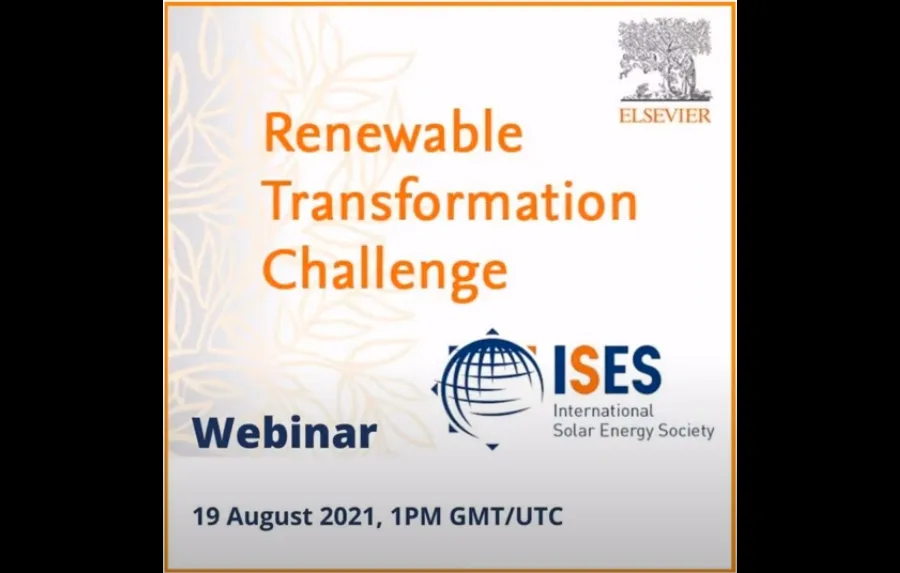
Watch now
|
Renewable Transformation Challenge Webinar -Towards a World Powered by Renewable Energy
Listen to our podcasts about the Renewable Transformation Challenge
About the Challenge background, prize and judging panel se abre en una nueva pestaña/ventana with Joanna Costello and Fernanda Ogochi
Learn about the judging criteria se abre en una nueva pestaña/ventana with Yogi Goswami and Joanna Costello
Learn why this challenge is so important and what the judges are looking for from the winning entry se abre en una nueva pestaña/ventana with Dr David Renné and Joanna Costello
About why we launched the Challenge, and what we learned from the 2017 award se abre en una nueva pestaña/ventana with Dr David Renné and Adam Fraser
